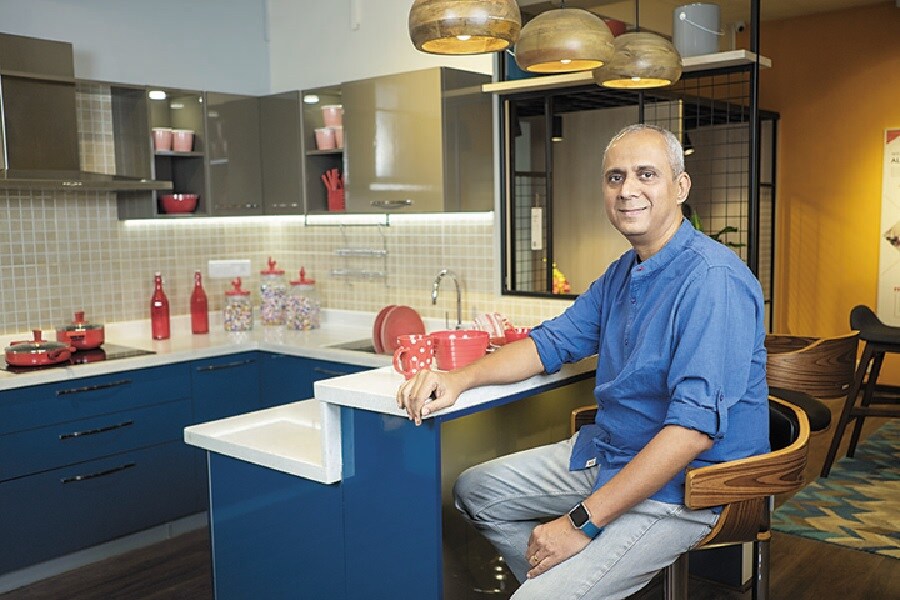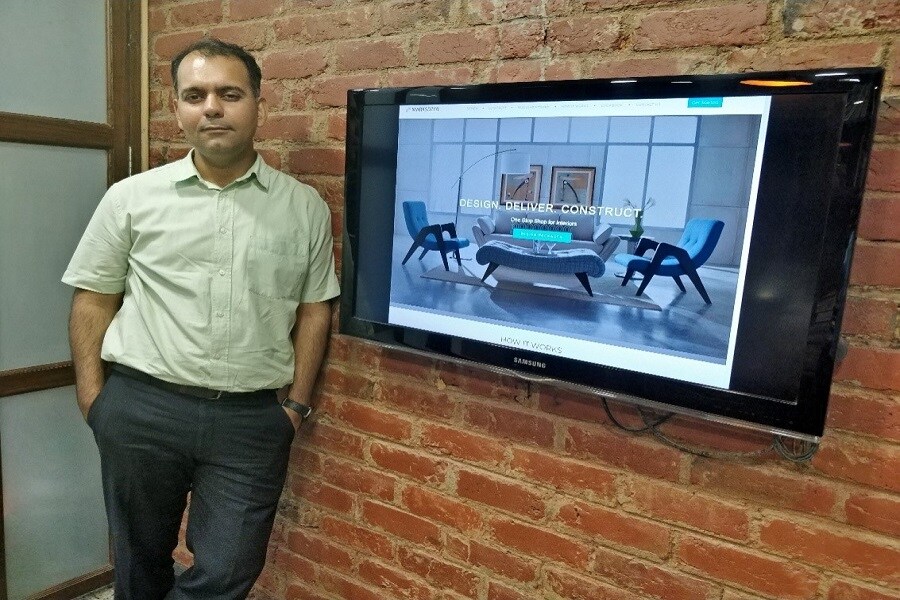Home Interiors: Re-designed, Re-engineered


Earlier if someone had to do their home interiors, the idea would be fraught with thoughts of unprofessionalism, delays, contractors charging more than the market rates, dealing with multiple vendors, uncertainty on product quality and so on. But now, this industry has undergone a significant shift with the emergence of a slew of start-ups who are focussed more on providing a simplified and tech-based interior experience. Needless to say the timing of these changes could not have been better and was exactly the need of the hour.
As per some industry estimates, the market size of home interiors is USD 50 Billion and is growing by a CAGR of 20-25%. The sector has been attracting the interest of venture capitalists in the last few years with many firms getting funded by the who’s who of the industry. One of the latest high profile entries has been by IKEA’s parent Ingka Group, which has invested in Livspace, a leader in this nascent space.
Today, in an industry starved of modernisation, Livspace, Homelane and a handful of others like Marks Dzyn, Bonito Designs, and Design Cafe are leveraging technology, marketing smarts and efficient execution to make the customer experience hassle-free. As SrikanthIyer of HomeLane puts it: “The industry is rife with unpredictability, in terms of pricing, timelines and quality of work. We’re solving for this.”
Delays are being replaced by professional corporate style timelines. Over pricing is being replaced by thorough and detailed pricing with utmost transparency. And in the midst of all this, services are getting affordable and consumer interests are getting far more importance than they ever did. There is now a very qualified, creative and professional approach to this field of work.
*****
Livspace has become the leader in this paradigm shift. It operates in many major cities including New Delhi, NCR, Mumbai, Bengaluru and Hyderabad. In 2014, Sharma, a former VP of engineering at Indian e-commerce giant Myntra, along with Srivastava, former head of worldwide product marketing for e-commerce at Google, decided to launch Livspace, a one-stop shop for home owners, containing everything from interior designs to a full-scale inventory of home décor items, allowing them to customize a living space and witness a project shape up from start to finish.
We see enthusiastic couples eager to visit Livspace’s sprawling design studio in Mumbai’s Lower Parel where modular kitchens, makeshift bedrooms and living spaces are on display. A virtual reality (VR) room allows customers to check out their 2D designs for real. They navigate from one room to the next with a joystick vetting their homes before they are built. “Visualizing the final look of their spaces hugely improves the overall experience for our customers,” says Anuj Srivastava, who co-founded Livspace with his IIT-Kanpur mate Ramakant Sharma in 2014. "Our real competition comes from the unorganised market." Anuj Srivastava, Co-founder Livspace
"Our real competition comes from the unorganised market." Anuj Srivastava, Co-founder Livspace
Image: MadhuKapparath
According to Srivastava, customers spend about 7-10 percent of their home value on interiors as a rule of thumb. Loose furniture, he estimates, constitutes only 15 percent of that spend, while the lion’s share goes towards services like flooring, false ceilings, electrical work, etc. At Livspace, average customer spends are about ₹10-12 lakh. For the price they pay, customers get a seamless experience—an online survey captures the scope of work, budget as well as customers’ tastes and aspirations. They are then matched with one of the 2,500 “designpreneurs” on Livspace’s marketplace model and an online consultation ensues. A proprietary software renders customers’ mock-ups, and they’re encouraged to visit one of Livspace’s design studios to get a touch-and-feel of what they’re opting in for.
*****
HomeLane, founded by veteran entrepreneur Iyer (he sold his education technology startup Erudite to TutorVista, which in turn was bought by Pearson Publishing) in 2014, works on a similar model with catalogue-based offerings. Customers are profiled using an online questionnaire and matched with one of the 900+ designers on their platform. They can then choose to virtually meet the designers on HomeLane’s proprietary ‘SpaceCraft’ platform or meet in person at one of its eight experience centres spread across Bengaluru, Chennai, Mumbai, Hyderabad and NCR. “From the outset we were clear this was not going to be an online-only play. It had to be an omni-channel model,” says Iyer. “Interior designing is not merely a product play. It’s a serviced-product play. Execution and delivery is all important.” Iyer claims more than 95 percent of HomeLane’s projects have been delivered on time. "The industry is rife with unpredictability. We"re solving for this." SrikanthIyer, CEO, Homelane
"The industry is rife with unpredictability. We"re solving for this." SrikanthIyer, CEO, Homelane
Image: NishantRatnakar for Forbes India
*****
Marks Dzyn is amongst the new entrants in this segment and perhaps the only one based out of Delhi. Founded by Ashish Dhingra, the start-up works on unique marketplace model, wherein furniture, on-site works and modular solutions are bundled and provided to clients with value added ‘Interior Design’ services. They charge a low flat fee for the design & coordination at Rs 7000/ room. “We wanted to make designing and the entire home interior experience a value added, affordable and responsible proposition”, says Ashish, a graduate of SPA Delhi, and an alumnus of XIM, Bhubaneswar. The process at Marks Dzyn is tech enabled a Marks Dzyn designer provides a comprehensive design using the in-house catalogue, or from associated brands with 3D visualization. A shopping list of furniture items selected is collated and ordered, similar to an e-commerce journey the site interior work is awarded to vetted contractors at pre-negotiated rates. Marks Dzyn oversees the entire project.“We have developed an in-house application which stitches the entire journey of the client with the designer. We are trying our best to provide an easy, pocket friendly and a satisfying home interior experience”, says Ashish .
*****
Another bespoke interior space creator Bonito Designs, raised $6.3 million in March 2019 from Tomorrow Capital to extend its operations. A design-centric start-up based in Bengaluru, Bonito’s journey started in 2012. Close to seven years in operation, the company, founded by Sameer AM and Rickson D"Souza, is now a team of 200-plus members, having worked on over 1,500 projects according to their website. Their process-driven delivery model is what separates them from the host of other interior design startups. It’s a simple five-step process: - Getting to Know You: As the name implies, this first step is all about getting acquainted with the client, the families, or individuals. - Design Phase: Post the acquaintance and understanding of individual preferences and personalities, the aim is to create a personalised design for the home. - Production Phase: In this phase, ideas are converted into realities. - Execution Phase: The Bonito team says this is when “you start seeing a lot of activities in your house”. - Handover: A bespoke, personalised home is handed over to the client.
Bonito Designs has been working towards its goal of making great designs accessible to Indian customers at affordable prices. Headquartered in Bengaluru, the company will soon be foraying into Mumbai, Pune and Hyderabad
*****
Yet another player in the market is Design Café. Design Cafe was founded by architect-cum-designer duo Shezan Bhojani and Gita Ramanan in 2011.Both the founders are architecture graduates from the BMS College of Engineering, Bengaluru. The company offers decor solutions to homes ranging in size from 1,000-2,000 square feet. Besides an online platform for providing solutions, the company also owns two experience centres in Bengaluru, one in Mumbai and one in Hyderabad, according to its website. The Company had raised Rs 200 crore ($28.5 million) in 2018, in an institutional round of funding led by homegrown private equity firm WestBridge Capital.
The firm is further leveraging the use of Virtual Reality (VR) devices to give customers a complete 360-degree experience of what their dream home will eventually look like. In order to carry out projects for its customers, Design Cafe has a 35000 square feet factory located on the outskirts of south Bengaluru, comprising of around 400 blue-collared workforce and multiple quality checks.
Design Café has designed and built almost 5000 homes across India. It aims to democratize design and offer absolute quality to the average home buyer at any and every budget. The brand is known for its innovative space maximization solutions and multi-functional designs.
As the industry is getting re-designed and re-engineered, the challenge we see is that the design and conceptualisation seems smooth but the actual manufacturing and construction part of the work i.e. execution(both onsite and offsite) often gets bungled. The companies that can manage these bottlenecks, micromanage the workforce effectively and render a more hassle free, happy and a predictable experience for the client will eventually be successful and emerge true winners.
Disclaimer: The views, suggestions and opinions expressed here are the sole responsibility of the experts. No Forbes India journalist was involved in the writing and production of this article.
First Published: May 21, 2020, 16:11
Subscribe Now